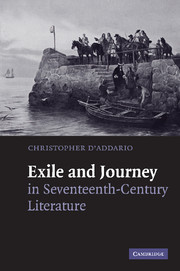Book contents
- Frontmatter
- Contents
- Acknowledgments
- Introduction: The “remanence” of the past: the early modern text in exile
- 1 Nostalgia and nationalism in New England literature
- 2 Exile and the semantic education of Thomas Hobbes's Leviathan
- 3 The expulsion from Paradise: Milton, epic and the restoration exiles
- 4 Sybil's leaves: Dryden and the historiography of exile
- Epilogue
- Notes
- Index
3 - The expulsion from Paradise: Milton, epic and the restoration exiles
Published online by Cambridge University Press: 22 September 2009
- Frontmatter
- Contents
- Acknowledgments
- Introduction: The “remanence” of the past: the early modern text in exile
- 1 Nostalgia and nationalism in New England literature
- 2 Exile and the semantic education of Thomas Hobbes's Leviathan
- 3 The expulsion from Paradise: Milton, epic and the restoration exiles
- 4 Sybil's leaves: Dryden and the historiography of exile
- Epilogue
- Notes
- Index
Summary
The King thought not fit to communicate the hopes he had, but left all men to cast about for themselves, “till they were awakened and confounded by such a prodigious act of Providence as [God] hath scarce vouchsafed to any nation, since he led his own chosen people through the Red Sea.”
(Edward Hyde, The History of the Rebellion)But I trust I shall have spoken perswasion to abundance of sensible and ingenuous men: to som perhaps whom God may raise of these stones to become children of reviving libertie; and may reclaim, though they seem now chusing them a captain back for Egypt, to bethink themselves a little, and consider whether they are rushing.
(Milton, The Readie and Easie Way)As much as 1660 marked a restoration, a miraculous return from the long Egyptian captivity for Edward Hyde, his master, the soon-to-be Charles II, and the exiled adherents to the royalist cause, it also marked a return to the long Israelite exile under the Stuarts and their ministers for the faithful supporters of the Good Old Cause. Indeed, the figure of the English people as the Israelites wandering their forty years in the desert nicely represents the divergent fortunes of the royalists and republicans in this moment of transition and uncertainty. In a very real sense, the Israelites of Clarendon and Milton's common allusion passed each other as ships in the night, somewhere in the English Channel, some taking Charles and his followers to their triumphant return, others sneaking the regicides and those intransigently opposed to Monck's settlement over to the Continent and the safety of the Low Countries and Swiss cantons.
- Type
- Chapter
- Information
- Exile and Journey in Seventeenth-Century Literature , pp. 87 - 123Publisher: Cambridge University PressPrint publication year: 2007



